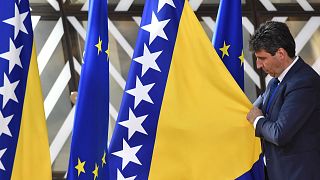
Bosnia and Herzegovina was considered a potential candidate to join the EU back in 2003
SARAJEVO, Oct 13 (NNN-XINHUA/AGENCIES) — The European Commission on Wednesday recommended that Bosnia and Herzegovina (BiH) be granted European Union (EU) candidate status on the understanding that further reforms are taken, the commission said in a press release.
The recommendation will then be considered by the European Council before BiH can join Albania, Moldova, North Macedonia, Montenegro, Serbia, Türkiye and Ukraine as an official candidate country.
As all 27 commissioners agreed on the recommendation, the EU will continue to closely monitor BiH’s expected progress to fulfil the 14 priority reforms involving judiciary, human rights, public administration, election law, anti-corruption and others, said Johann Sattler, head of the EU Delegation to BiH, during a press conference on Wednesday in Sarajevo.
BiH will continue to fulfil all key legislative and institutional priority reforms for the country’s sake and for joining the EU family, said Zoran Tegeltija, chairman of the Council of Ministers of BiH.
In 2016, BiH submitted its application to join the EU, which was adopted by the European Commission in 2019 with the 14 priority reforms the country has to fulfil identified.
Bosnia and Herzegovina is a country with a unique political system born out of bloody civil wars.
From 1945 to 1992, Bosnia was part of the multi-national Socialist Federal Republic of Yugoslavia, which rapidly crumbled and split into seven independent states.
Bosnia’s three main ethnic groups — the Eastern Orthodox Serbs, Catholic Croats and Muslim Bosniaks — were drawn into a civil conflict that escalated into campaigns of ethnic cleansing, mass rape and concentration camps.
The war saw 100,000 casualties, with two million people becoming either refugees or internally displaced, culminating in the genocide of Bosniaks in Srebrenica in July 1995.
The 1995 Dayton Peace Accords, which were sponsored by the United States in a bid to end the violence, instituted two main administrative units in Bosnia — the Serb-dominated entity of Republika Srpska (RS) and the Bosniak-Croat majority Federation of BiH (FBiH).
The intricate system installed by the Dayton peace deal struck a very delicate balance of power and has often come under strain by simmering tensions between the ethnic groups.
Earlier this year, a political crisis erupted after lawmakers of the Bosnian Serb-majority entity voted to create a separate judiciary from the rest of the country, a step condemned as secessionist and illegal.
Christian Schmidt, the High Representative in charge of overseeing the implementation of the civilian aspects of the Dayton Peace Accords, has previously accused the Bosnian-Serb leaders of systematically challenging the peace deal’s provisions and trying to usurp powers granted to the federal government.
Russia’s invasion of Ukraine also exposed the fractures between the different factions. The Oct 2 elections were marred by allegations of vote rigging and sparked mass protests.
The latest developments are set to weigh on the deliberations among EU leaders. It’s still unclear when a vote on Bosnia’s bid could take place. — NNN-XINHUA/AGENCIES





